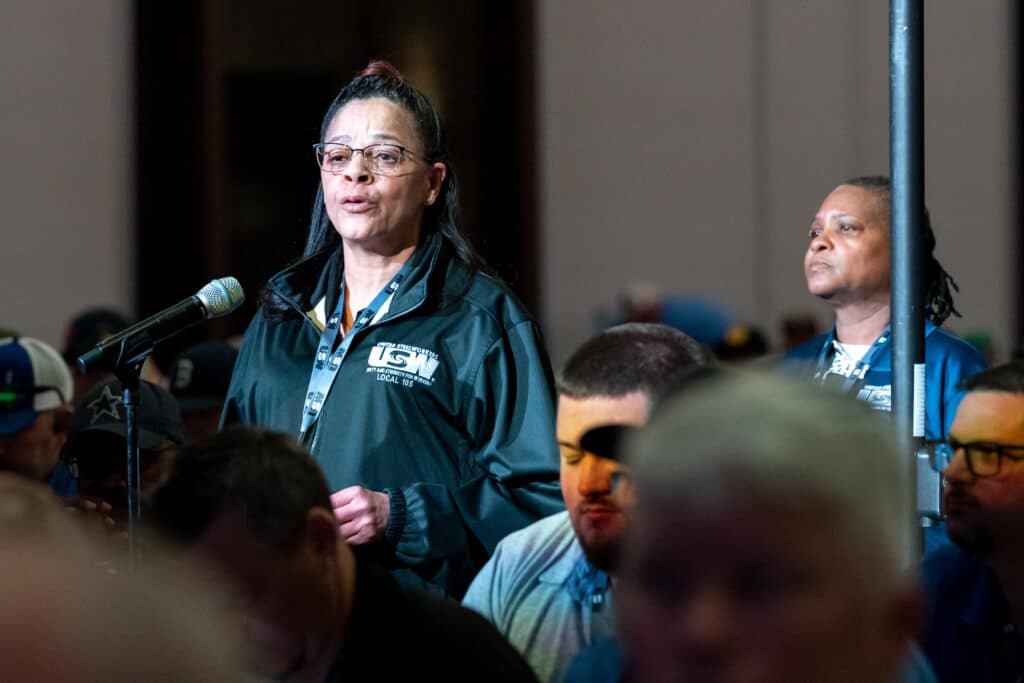
Medicaid Saved Her. Now, She Gives Back.
By David McCall
USW International President
Tonya Clark sat in her car along the side of the road—sobbing—after the doctor’s office called to say she had breast cancer.
She worried about dying young, like her mother did. She agonized about her three children, the youngest still a teenager and finding his way.
And Clark, a single mom who had no health insurance despite working two jobs, wondered how in the world she’d pay for the grueling treatments to come.
Fortunately, a social worker helped her enroll in Medicaid, a federally supported program that provides health care to people with little income.
Medicaid sustained Clark, then 37, through surgeries, chemotherapy, radiation and other hardships, enabling her to focus on fighting for her health and staying strong for her children. That’s why she’s incensed that Republicans in Congress want to cut this lifeline for ordinary Americans, just so they can help Donald Trump fund more tax cuts for the rich.
“It saved my life. Do you hear me? It kept me here with my family,” said Clark, now 61, a member of United Steelworkers (USW) Local 105 in Bettendorf, Iowa.
“They don’t understand,” she added of the Republicans eyeing to slash billions from the program. “There are people who really need it. I was one of them.”

Americans overwhelmingly oppose more handouts for the billionaire class and corporations. However, they fervently support Medicaid, in part because so many depended on it at one time or know someone who survived because of it.
In all, more than 70 million Americans—disadvantaged adults as well as infants, children and seniors—rely on Medicaid today. Recipients must meet rigorous eligibility requirements, meaning life dealt every one of them the kind of blow that sent Clark reeling years ago.
Clark still chokes up recalling those dark days: finding a lump in her breast, undergoing a biopsy, pulling off the road and taking that call from the doctor’s office, her kids watching wide-eyed as she “lost it” in the car.
Then came surgery, chemo and radiation, followed by the discovery of cancer in her other breast. Clark, just 13 when she lost her mother to a liver-related ailment, tried to prepare her own kids for the worst.
“I don’t know what’s going on,” she remembered telling them. Referring to her mom, she added, “Maybe this is what’s going to happen to me.”
“I didn’t want to leave my kids, even though they were grown up,” she said. “One was in the military. One was rebuilding cars. I was just beginning to get my youngest son into the world of work. He was 14.”
Clark underwent a double mastectomy and other procedures, enduring not only physical pain but the psychological impact of her diagnosis, treatment and recovery. At a time of grave uncertainty, she said, Medicaid provided a source of stability.
The program operated exactly as intended, providing her with a temporary bridge to more secure times. With better health, she left the program and moved forward—decisively—on her own.
“I was grateful for Medicaid,” she said. “But when the end came, it came.”
She quit her low-paying, part-time jobs at a convenience store and meat market. She learned how to drive a truck. And she landed a USW-represented position at Arconic’s Davenport Works, where she continues to earn good wages and quality health care.
Empowered like never before, Clark persevered through the tough days in her new job and recalled the pride she felt when a co-worker told her: “I saw something in you, and look at you now.”
Clark praises Medicaid for leveling the playing field for the most disadvantaged Americans. But she also views the program as an investment in a stronger, more vibrant nation, ultimately benefiting everyone.
For example, feeling a need to repay Medicaid, Clark turned her debt into dividends.
She donates food, clothing and toys to those in need. She supports a homeless shelter. During a dinner at the shelter one day, she took off her coat and gave it to a young woman who needed one.
She’s also very active in her local union, serving as a steward and trustee, as a member of the Civil and Human Rights Committee and as an activist in the USW’s Women of Steel program. Through these roles, among others, she helps co-workers assert their rights and remain safe on the job.
“There’s a method to my madness,” she explained. “I needed help, too. I try my best to give back.”
Along with other USW members, Clark turned out a few weeks ago when the AFL-CIO organized a rally at the Mississippi Valley Fairgrounds in Davenport to oppose Trump’s cuts to the federal work force as well as the potential gutting of Medicaid and other vital programs.
The group urged Trump to stand with working people, not billionaires, and to ensure everyday Americans have the supports they need to thrive.
Clark took home one of the signs distributed to participants that day—“Hands off Medicaid,” it says—and stuck it in her living room window so everyone passing by can see it.
“It’s important,” she said of the program that helped her navigate her way from despair to well-being. “That help goes a long way. It goes a very long way.”
By clicking Sign Up you're confirming that you agree with our Terms and Conditions.
Related Blogs
Ready to make a difference?
Are you and your coworkers ready to negotiate together for bigger paychecks, stronger benefits and better lives?

